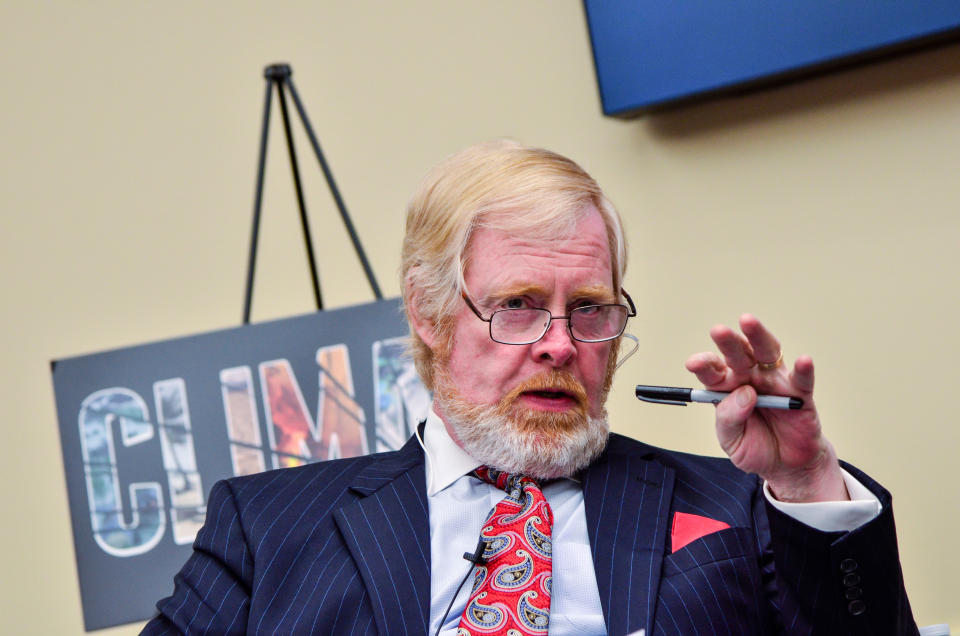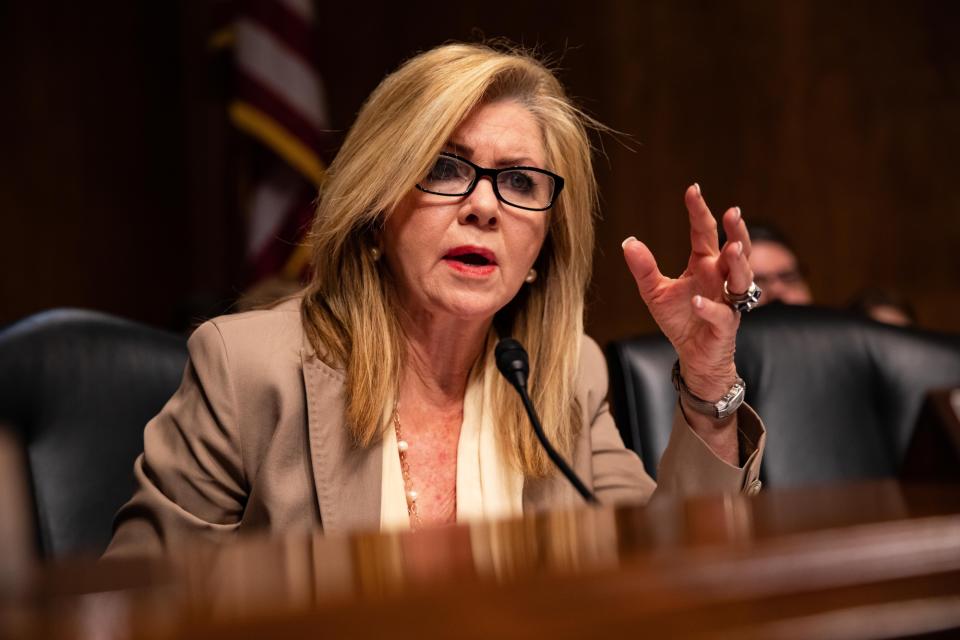Trump Says He’ll Summon Companies After Social Media ‘Summit’
(Bloomberg) -- President Donald Trump said he’d summon social media companies for a meeting at the White House to discuss conservative grievances about alleged political bias on their platforms, and that he had directed his administration to explore methods to protect online speech.
“We will ask representatives of the major social media platforms to join me at the White House over the next month,” Trump told his audience at an event Thursday the White House billed as a “social media summit.”
“Have a big meeting and a real conversation,” Trump said. He also said he would direct the administration to “explore all regulatory and legislative solutions to protect free speech and the free speech rights of all Americans.”
“We’re fighting for you very hard,” the president said earlier, after he and other speakers at the event complained of suffering censorship by social media companies. “We’re going to be calling a big meeting of the companies for -- in a week or two. They have to be here.”
While Facebook Inc. and Twitter Inc. and other internet platforms weren’t invited to Thursday’s event, several presidential fans, provocateurs, leaders of conservative groups, media figures, and lawmakers said they were going -- including some who’ve faced allegations of racism and antisemitism, trolling and conspiracy theories.
“Some of you are extraordinary,” Trump told the audience. “Can’t say everybody. The crap you think of is unbelievable.”
Later, he added: “Some of you guys are out there. I mean it’s genius, but it’s bad.”
Representatives of Google, Facebook and Twitter declined to comment on the potential White House meeting.
Bias Claims
The president said the “journalists” and “influencers” who attended the event are “fulfilling a vital role in our nation” by communicating “directly with our citizens without having to go through the fake news filter.” Trump has often said his @realDonaldTrump Twitter account, where he frequently announces official news, is vital for him to communicate directly with the American public.
Despite claims that they face systematic bias by companies hosting social media platforms, Trump enjoys an audience of about 62 million followers at his personal Twitter account and more than 24 million at his official Facebook page. He said he and his summit audience reach a combined “half a billion followers.”
“I know that we’ve been blocked,” Trump said, relating anecdotes about people telling him they were unable to follow his Twitter account.
The event was billed as a way to “bring together digital leaders for a robust conversation on the opportunities and challenges of today’s online environment,” according to a statement announcing the meeting. But the confirmed attendees were primarily conservative tech critics who echo Trump’s own complaints that social media systematically silences conservative voices.
Trump said that when the conference concludes, he’ll speak on the 2020 U.S. Census. Trump will retreat from his effort to include a citizenship question in the decennial census after a defeat at the U.S. Supreme Court, and will seek the information through other means, an administration official said.
The president has repeatedly accused large technology platforms such as Twitter, Facebook and Alphabet Inc.’s Google of anti-conservative bias, with little evidence. Last month, he said the U.S. government should sue Facebook and Google for unspecified wrongdoing.
In May, the administration posted a form urging people to report potential political censorship by the social media companies, which White House spokesman Judd Deere said on Wednesday got “thousands of responses.” The form is now defunct.
“I don’t think there’s going to be serious policy matters discussed,” said Ethan Porter, a professor at George Washington University who has studied the political role of media in the Trump era. “It looks like a theatrical gathering at the White House -- a venting session for conservative media stars.”
Senator Josh Hawley also spoke at the event. The Missouri Republican is pushing legislation that would require social media companies to certify they don’t engage in censorship based on politics or face revocation of liability protections for content their users post. Trump called his proposal “important.”
QAnon, O’Keefe
The summit attracted figures like Bill Mitchell, a Twitter booster of Trump’s who has promoted the conspiracy theory known as QAnon; as well as the person behind a pro-Trump meme account known as @CarpeDonktum, whose work has attracted retweets from the president.
Brent Bozell, who heads an organization devoted to exposing alleged liberal media bias and once compared President Barack Obama to “a skinny, ghetto crackhead,” was also expected, alongside another Twitter personality who has said the media was pushing a civil war.
The conservative nonprofit Project Veritas, which uses undercover sting operations in attempts to expose wrongdoing, said founder James O’Keefe would be there. Senator Marsha Blackburn, a Tennessee Republican and frequent Google critic, is scheduled to attend, as is Republican Representative Matt Gaetz of Florida.
Traditional Washington conservative organizations such as the Heritage Foundation will be represented. So will a fairly new one, the youth-focused group Turning Point USA, which has been accused of promoting baseless claims against liberals.
The White House schedule initially listed the event as closed to the press, but a revised version said Trump’s remarks will be open to reporters. “The Fake News Media will also be there, but for a limited period,” Trump tweeted.
Ben Garrison, a pro-Trump political cartoonist, tweeted Wednesday that his invitation had been rescinded after criticism that one of his works, which depicted Jewish financiers controlling U.S. foreign policy, was anti-Semitic. Garrison denied the accusation.
Election Connection
Accusing social media companies of shutting out conservative agendas could help Trump maintain ties to allies, some of whom have devoted media followings of their own, Porter said. Trump officially launched his re-election campaign last month, and it reported last week that he and the Republican National Committee had together raised $105 million in the second quarter and had $100 million in available cash.
Nearly 65% of Republicans or those who lean Republican believe big tech companies support liberal views over conservative ones, and a full 85% think it’s at least somewhat likely the companies are intentionally censoring viewpoints, according to a Pew Research Center survey from last year.
“There is a segment of the population that’s motivated to get out to vote based on what they’re against,” said Kevin Madden, a former spokesman for Republican Mitt Romney’s presidential campaign who has also worked with technology companies.
Michael Beckerman, president of the Internet Association, a trade group that represents large technology companies, said in a statement that his members provide “the best tool for promoting voices from all political perspectives in history,” including conservatives.
“Internet companies are not biased against any political ideology, and conservative voices in particular have used social media to great effect,” Beckerman said.
Pressure on the technology companies is increasing in Washington as Republicans in Congress dig into allegations of conservative bias, Democrats in the House conduct an antitrust inquiry and enforcers at the Justice Department and the Federal Trade Commission divvy up oversight of Google, Facebook, Apple Inc., and Amazon.com Inc. Politicians from both parties are also exploring limiting liability protections that the companies enjoy for third-party content.
Jesse Blumenthal, who directs tech policy for the network of groups funded by the libertarian Koch brothers, said that those on the right have long feared gatekeepers would keep conservative opinions from out of the public square.
“That is not a new complaint,” said Blumenthal, who advocates for the government to stay out of speech issues. “What is new is, so what do you want the government to do about it?”
The fight to remove the government from regulating speech resulted in the successful push to end the “fairness doctrine” that required television broadcasters give equal amounts of time to candidates seeking public office, Blumenthal said. Trump has mused about bringing the idea back for social media.
--With assistance from Alyza Sebenius and Margaret Talev.
To contact the reporter on this story: Ben Brody in Washington at [email protected]
To contact the editors responsible for this story: Sara Forden at [email protected], Justin Blum
For more articles like this, please visit us at bloomberg.com
?2019 Bloomberg L.P.

